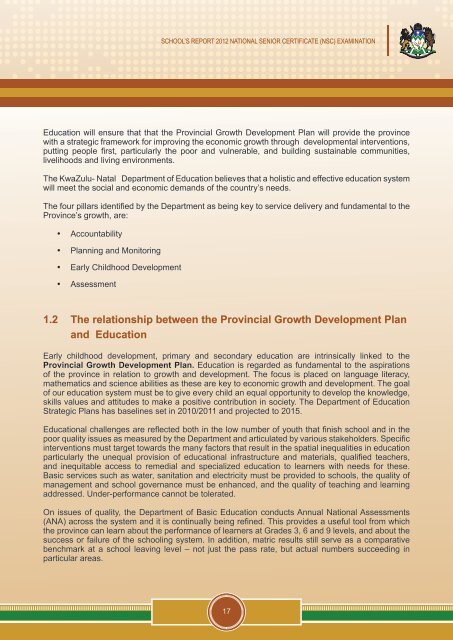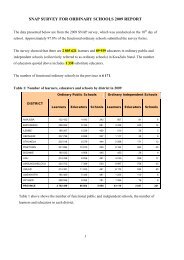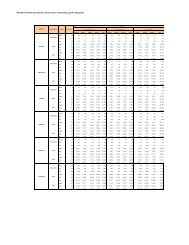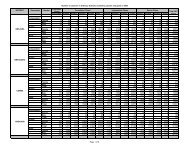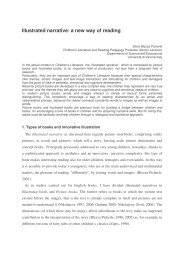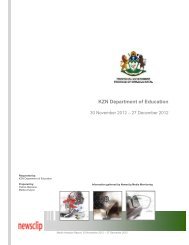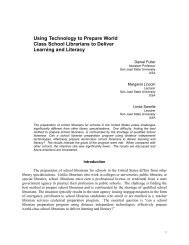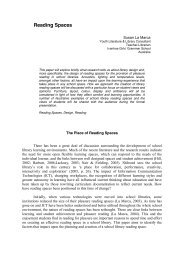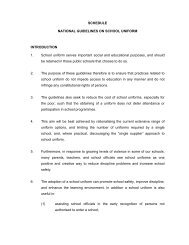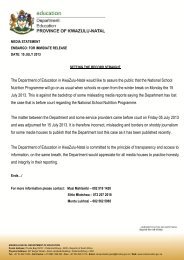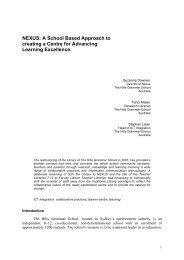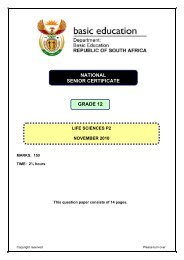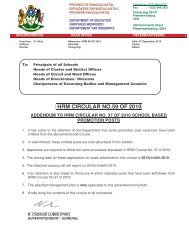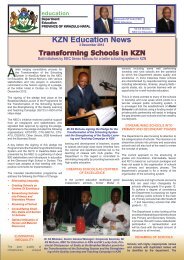School's Report 2012 National Senior Certificate (NSC) Examination
School's Report 2012 National Senior Certificate (NSC) Examination
School's Report 2012 National Senior Certificate (NSC) Examination
You also want an ePaper? Increase the reach of your titles
YUMPU automatically turns print PDFs into web optimized ePapers that Google loves.
SCHOOL’S REPORT <strong>2012</strong> NATIONAL SENIOR CERTIFICATE (<strong>NSC</strong>) EXAMINATION<br />
Education will ensure that that the Provincial Growth Development Plan will provide the province<br />
with a strategic framework for improving the economic growth through developmental interventions,<br />
putting people first, particularly the poor and vulnerable, and building sustainable communities,<br />
livelihoods and living environments.<br />
The KwaZulu- Natal Department of Education believes that a holistic and effective education system<br />
will meet the social and economic demands of the country’s needs.<br />
The four pillars identified by the Department as being key to service delivery and fundamental to the<br />
Province’s growth, are:<br />
• Accountability<br />
• Planning and Monitoring<br />
• Early Childhood Development<br />
• Assessment<br />
1.2 The relationship between the Provincial Growth Development Plan<br />
and Education<br />
Early childhood development, primary and secondary education are intrinsically linked to the<br />
Provincial Growth Development Plan. Education is regarded as fundamental to the aspirations<br />
of the province in relation to growth and development. The focus is placed on language literacy,<br />
mathematics and science abilities as these are key to economic growth and development. The goal<br />
of our education system must be to give every child an equal opportunity to develop the knowledge,<br />
skills values and attitudes to make a positive contribution in society. The Department of Education<br />
Strategic Plans has baselines set in 2010/2011 and projected to 2015.<br />
Educational challenges are reflected both in the low number of youth that finish school and in the<br />
poor quality issues as measured by the Department and articulated by various stakeholders. Specific<br />
interventions must target towards the many factors that result in the spatial inequalities in education<br />
particularly the unequal provision of educational infrastructure and materials, qualified teachers,<br />
and inequitable access to remedial and specialized education to learners with needs for these.<br />
Basic services such as water, sanitation and electricity must be provided to schools, the quality of<br />
management and school governance must be enhanced, and the quality of teaching and learning<br />
addressed. Under-performance cannot be tolerated.<br />
On issues of quality, the Department of Basic Education conducts Annual <strong>National</strong> Assessments<br />
(ANA) across the system and it is continually being refined. This provides a useful tool from which<br />
the province can learn about the performance of learners at Grades 3, 6 and 9 levels, and about the<br />
success or failure of the schooling system. In addition, matric results still serve as a comparative<br />
benchmark at a school leaving level – not just the pass rate, but actual numbers succeeding in<br />
particular areas.<br />
17


